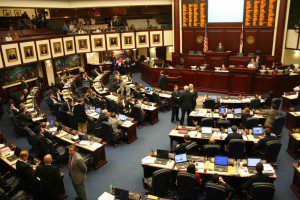Lawmakers’ second attempt at a Senate map that would meet constitutional muster passed the House on a relatively narrow 61-47 margin Tuesday, with House Democrats and Miami-Dade Republicans complaining that the new plan represented little real improvement over the first.

Every Republican member of the Miami-Dade caucus and Rep. Denise Grimsley, R-Sebring, joined Democrats in opposing the plan.
In a debate that lasted little more than an hour, supporters argued that the changes in the maps systematically answered each of the objections that the Florida Supreme Court lodged to the original Senate plan. Justices threw out the first draft of the Senate map for violating the anti-gerrymandering Fair Districts amendments approved by voters in a November 2010 referendum.
House Redistricting Chairman Will Weatherford, R-Wesley Chapel, also pointed out that the failure to pass a map would result in the Supreme Court drawing its own plan — something that would happen anyway if the court strikes down the second draft.
“If this map doesn’t pass, what this body is doing is abdicating its responsibility to the Supreme Court,” Weatherford said.
But Democrats said the second draft was plagued by the same problems as the first: carving up the state to favor Republicans who dominate the Legislature despite having fewer registered voters and preserving incumbents. They hammered the plan for drawing only two incumbents into the same district.
“It kind of reminds me of the gang that couldn’t shoot straight,” said Rep. Franklin Sands, D-Weston.
Republicans brushed off the suggestions that only having one district where two senators would be forced to run against each other — and where Sen. David Simmons, R-Maitland, has already said he will move to avoid that showdown — violated the constitutional ban on intentionally favoring incumbents.
A Democratic alternative by Rep. Evan Jenne of Dania Beach — who said it would force a fifth of Senate incumbents to face off with each other — was shot down on a party line, 72-36 vote. But even Democratic members of the House noted that the map was mostly put forward to offer an alternative for the Supreme Court to look at when it reviews the new map.
The Florida Democratic Party’s response was more succinct: “We’ll see you in court,” spokeswoman Brannon Jordan said in a statement issued moments after the vote.
Meanwhile, Republicans from Southeast Florida raised objections of their own, saying the map violated the Voting Rights Act by not including a fourth district in Miami-Dade that would clearly allow the Hispanic community an opportunity to elect a candidate of its choice. Amendments carving out that district were repeatedly rejected in the upper chamber.
“And here we are again, having to justify the blatant disregard for the Hispanic population of Miami-Dade County,” said Rep. Jeanette Nunez, R-Miami.
House Majority Leader Carlos Lopez-Cantera, R-Miami, said he believed a fourth district would be created at some point, with a challenge under the Voting Rights Act likely if the Supreme Court allows the new map to stand.
“I just wish the Florida Senate had done it and not left it to the judiciary to do so,” he said.
By Brandon Larrabee


